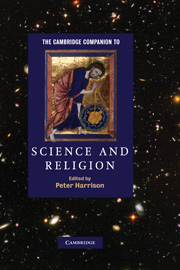Book contents
- Frontmatter
- Introduction
- Part I Historical interactions
- Part II Religion and contemporary science
- Part III Philosophical perspectives
- 11 Atheism, naturalism and science: three in one?
- 12 Divine action, emergence and scientific explanation
- 13 Science, God and cosmic purpose
- 14 Ways of relating science and religion
- A guide to further reading
- Index
12 - Divine action, emergence and scientific explanation
from Part III - Philosophical perspectives
Published online by Cambridge University Press: 28 July 2010
- Frontmatter
- Introduction
- Part I Historical interactions
- Part II Religion and contemporary science
- Part III Philosophical perspectives
- 11 Atheism, naturalism and science: three in one?
- 12 Divine action, emergence and scientific explanation
- 13 Science, God and cosmic purpose
- 14 Ways of relating science and religion
- A guide to further reading
- Index
Summary
Philosopher Richard Rorty claims that it is 'pictures rather than propositions, metaphors rather than statements, which determine most of our philosophical convictions'. The picture that has predominated in discussions of the topics of this chapter, throughout the modern era, has been that of a hierarchy of sciences, each higher science studying more complex entities made up of the entities studied by the science below. Today the hierarchy is taken (unproblematically) to include various levels of physics, chemistry, and the many levels of biology from molecular biology to scientific ecology. Whether the human and social sciences can be added to the hierarchy has remained a contentious issue, one closely tied to debates about human nature. This chapter will explore the consequences of this picture for understanding scientific explanation, human freedom and God's action in the physical world. We shall see that when causal reductionism (the idea that all causation occurs at the bottom of the hierarchy of complexity) and the idea of deterministic laws of nature are added to the picture, it produces (apparently) insoluble problems in understanding human and divine action. In short, the combination of these three assumptions suggests that the determinism of physical laws 'works its way up' the hierarchy of complex systems, resulting in a fully determined natural world.
- Type
- Chapter
- Information
- The Cambridge Companion to Science and Religion , pp. 244 - 259Publisher: Cambridge University PressPrint publication year: 2010
- 5
- Cited by

